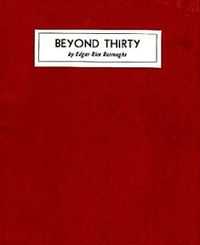Beyond Thirty
- This article is about a 1915 book. For other uses, see The Lost Continent.
| Beyond Thirty | |
|---|---|
 First book edition of Beyond Thirty | |
| Author | Edgar Rice Burroughs |
| Country | United States |
| Language | English |
| Genre | Science fiction novel |
| Publisher | Fantasy Press |
Publication date | 1955 |
| Media type | |
| Pages | 57 p. |
| ISBN | NA |
Beyond Thirty is a short science fiction novel by Edgar Rice Burroughs. It was written in 1915 and first published in All Around Magazine in February 1916, but did not appear in book form in Burroughs' lifetime. The first book edition was issued by Lloyd Arthur Eshbach's Fantasy Press fanzine in 1955; it then appeared in the collection Beyond Thirty and The Man-Eater, published by Science-Fiction & Fantasy Publications in 1957. The work was retitled The Lost Continent for the first mass-market paperback edition, published by Ace Books in October 1963; all subsequent editions bore the new title until the Bison Books edition of March 2001, which restored the original title.

Plot
The story was heavily influenced by the events of World War I, and reflects U.S. sentiments at the time of writing. When the war broke out, Americans were predominantly isolationist and wary of being drawn into a European war. Burroughs imagines a future two centuries onward in which that view prevailed and the western hemisphere severed contact with the rest of the world. Consequently, the eastern hemisphere has exhausted itself in war and Europe descended into barbarism while while the Americas, sheltered from the destruction, have continued to advance and joined peacefully into the union of Pan-America. By the twenty-second century the entire world east of the 30th meridian west and west of the 175th meridian east has become terra incognita to Pan-America.
In 2137, Pan-American Navy Lieutenant Jefferson Turck is commander of the aero-submarine Coldwater, tasked with patrolling the 30th meridian from Iceland to the Azores. Disaster strikes when the vessel's anti-gravitation screens fail, dooming it to wallow upon the surface of the ocean, and the engines fail, leaving it adrift. As its wireless radio has failed as well, Turck cannot even summon help. It is implied that the perfidy of the Coldwater’s second officer is behind its misfortunes, as well as the abandonment Turck and three companions at sea in a small boat in the course of its repairs.
Adrift, Turck and his companions are forced to make shore in forbidden England. Turck falls into the hands of raiders from the Abyssinian Empire, a black super-state ruling all of Africa, most of Europe, and the Arabian peninsula. While the Abyssinians' technology is roughly equivalent to that of the nineteenth century, the white savages that populate Europe in Turck’s time are no match for them. The Abyssinians consider whites a lower order and take them as slaves. Turck too is pressed into slavery. Becoming the personal servant of an Abyssinian colonel he is treated better than many of his fellow slaves, but is rankled by his status.
Turck's master takes him to the court of the Abyssinian Emperor, Menelek XIV. Menelek is portrayed as gross and cruel, perhaps once a great man, but now corrupted by power. Turck watches powerless as white slave women are offered to the emperor for his harem, including the heroine Victory, queen of the primitives of England. Eventually Turck succeeds in rescuing Victory and makes his way with her to the rival empire of China. Communications between the hemispheres are re-opened, with commerce to follow, and Turck, despite violating the edict against crossing the 30th meridian, is hailed as a hero in Pan-America.
Copyright
The copyright for this story has expired in the United States and, thus, now resides in the public domain there.
External links
- Ebook from Project Gutenberg
- The text of the novel at ERBlist.com
- Edgar Rice Burroughs Summary Project page for Beyond Thirty
- Librivox Audio Book of The Lost Continent